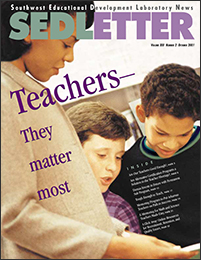A Click Away - Online Resources for Recruitment, Retention, and Quality Issues
Teacher Quality and Preparation
 Solving the Dilemmas of Teacher Supply, Demand, and Standards: How We Can Ensure a Competent, Caring, and Qualified Teacher for Every Child, written by Linda Darling Hammond, and published by the National Council on Teaching and America's Future, examines the balance between hiring enough teachers to staff our nation's schools and ensuring high teacher quality. The report looks at differences in standards across states and presents teacher retention data and student achievement data based on type of teacher preparation program. A PDF file may be downloaded at http://www.nctaf.org/documents/supply-demand-standards.pdf.
Solving the Dilemmas of Teacher Supply, Demand, and Standards: How We Can Ensure a Competent, Caring, and Qualified Teacher for Every Child, written by Linda Darling Hammond, and published by the National Council on Teaching and America's Future, examines the balance between hiring enough teachers to staff our nation's schools and ensuring high teacher quality. The report looks at differences in standards across states and presents teacher retention data and student achievement data based on type of teacher preparation program. A PDF file may be downloaded at http://www.nctaf.org/documents/supply-demand-standards.pdf.
Better Teachers, Better Schools is a collection of essays and studies edited by Marci Kanstoroom and Chester E. Finn, Jr., and published by the Thomas B. Fordham Foundation. The publication examines teacher quality, standards, and certification from a number of perspectives and may be found online at http://www.edexcellence.net/publications-issues/publications/betterteachers.html. Two of the pieces in Better Teachers, Better Schools take a critical look at reforms proposed by the National Board for Professional Teaching Standards and the National Council for Accreditation of Teacher Education.
The Southeast Center for Teaching Quality, http://www.teachingquality.org/, is a regional center affiliated with the National Commission on Teaching and America's Future (NCTAF) that focuses on issues related to teacher quality in the states of Alabama, Arkansas, Florida, Georgia, Kentucky, Louisiana, Mississippi, North Carolina, South Carolina, and Tennessee. The Web site features articles and PowerPoint presentations on teacher quality issues that may be accessed at: http://www.teacherleaders.org/search/resource. These include "Teaching Quality in the Southeast: A Call for Action," "Quality Alternatives in Teacher Preparation: Dodging the 'Silver Bullet' and Doing What is Right for Students," and "Does Teacher Certification Matter? Evaluating the Evidence."
The National Center for Education Information recently published Alternative Teacher Certification: A State-by-State Analysis 2001. A summary of the report and ordering information may be found online at http://www.ncei.com/introduction04.html (Note link now points to 2004 version as of 7/2004). The summary includes information on the history of alternative certification and a brief discussion of research that has been conducted on alternative certification.
Teacher Recruitment and Retention
Recruiting New Teachers, Inc., a nonprofit corporation based in Belmont, Massachusetts, has developed informative and practical toolkits and publications designed to help schools and districts face the challenges of recruiting and retaining a qualified, diverse workforce.
A Guide to Today's Teacher Recruitment Challenges is available from the National Teacher Recruitment Clearinghouse http://www.rnt.org/channels/clearinghouse/. The guide discusses factors contributing to teacher supply and demand and the importance of teacher diversity. It provides pointers for effective recruitment for diversity and for selling your district to prospective teachers.
RNT also offers online A Guide to Developing Paraeducator-to-Teacher Programs and A Guide to Developing Teacher Induction Programs. A Guide to Developing Paraeducator-to-Teacher Programs offers the advantages and obstacles to instituting such a program and provides some real-life examples. A Guide to Developing Teacher Induction Programs points out the need for induction programs and describes elements of good induction programs. It also discusses mentoring and peer review programs as components of an induction program.
Creating a Teacher Mentoring Program, published by the National Education Association's Foundation for the Improvement of Education, may be accessed at http://www.nfie.org/publications/mentoring.htm. This paper is a result of a mentoring symposium sponsored by NFIE and the United Teachers of Los Angeles. It touches on the usefulness of mentoring, how to create the structure needed for an effective mentoring program, and how to measure the effectiveness of a mentoring program
SEDL's study, Mentoring Beginning Teachers: Lessons from the Experience in Texas, may be downloaded at http://www.sedl.org/pubs/catalog/items/pol23.html. The study examined three questions: (1) How have schools and districts in Texas planned and implemented mentoring programs to respond to state policy on teacher induction? (2) What are the characteristics of district or school mentoring programs in the state with respect to resource allocation, range of activities, and effectiveness? and (3) What are the implications of current mentoring activities for the retention of teachers in districts or schools with increasingly diverse student populations?
The report features case studies of three school districts and a chapter profiling the first year of teaching.
Next Article: Credits

